American Independence Museum Workshop
Exeter, New Hampshire
October 4, 2019
The subject of this collection is Continental Army Officer John Laurens’ devotion to the ideals of liberty, equality, civic responsibility and natural and civil rights and his passionate advocacy for the emancipation of African Americans in return for their armed service during the Revolution.
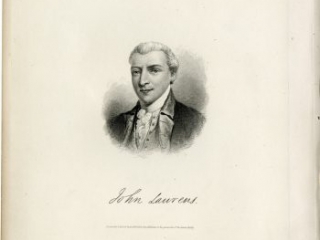
Click for a larger view.
John Laurens
New York: Bradford Club, ca. 1867The Society of the Cincinnati, The Robert Charles Lawrence Fergusson Collection
John Laurens, an Aide-de-Camp to General Washington and was killed in 1782, was an eligible member of the Society of the Cincinnati from the state of South Carolina.Title is facsimilie signature. Below title is printed: "Engraved by C. Burt for the Bradford Club from a miniature in the possession of the Laurens family."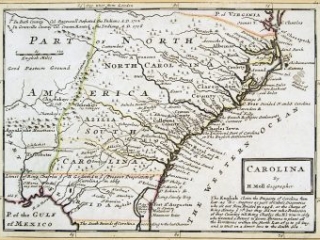
Click for a larger view.
Carolina
Herman Moll
London: 1736The Society of the Cincinnati, The Robert Charles Lawrence Fergusson Collection
This map, which extends from the south bounds of Carolina to C. Charles in Virginia, shows the location of American Indian tribes in the Carolinas. It gives the chief roads or trading routes westward from Charleston, and many islands along the coast are identified by name for the first time on a printed map. In later states of map, "Azilia" was changed to "Georgia."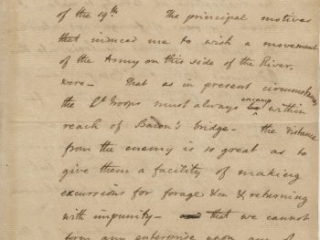
Click for a larger view.
John Laurens to Nathanael Greene
March 20, 1782The Society of the Cincinnati, The Robert Charles Lawrence Fergusson Collection
Lt. Col. John Laurens joined the army as an aide-de-camp to General Washington in 1777. He was an opponent of slavery and an advocate of allowing slaves to earn their freedom by fighting as soldiers in the revolutionary war. In this letter to General Greene, Laurens recommends advancing the American positions to more closely engage with the enemy, and suggests strengthening their front by building new works that could be "performed altogether by blacks." He laments the lack of arms and clothing among the American troops, and he reports on the successful capture of a British schooner by a Captain Rudolph.![Click for a larger view. Marie Joseph Paul Yves Roch Gilbert Du Motier, marquis de Lafayette, A.D.S. La Grange [France], November 10, 1825](https://www.americanrevolutioninstitute.org/wp-content/uploads/2019/10/MSS-L2010F168-Lafayette-ADS-La-Grange-November-10-1825-recto-large-350x436-320x240_c.jpg)
Click for a larger view.
Marie Joseph Paul Yves Roch Gilbert Du Motier, marquis de Lafayette, A.D.S. La Grange [France]
November 10, 1825The Society of the Cincinnati, The Robert Charles Lawrence Fergusson Collection
Soon after his return to France from his grand tour of the United States in 1824-1825, Lafayette wrote this memoir of his former comrade-in-arms Lt. Col. John Laurens of South Carolina, who was killed in action at Combahee River in 1782: "The brilliant, devoted, and steady services of Col. Laurens in our revolutionary struggle are so conspicuously connected with the history of American independence and freedom that a minute account of his civil, military, and political career would be superfluous. I shall only observe that either as a champion of a cause, and the citizen of a country both of which he loved with enthusiasm, or as the most valued aid de camp to the commander in chief, as a gallant leader in the field of action, as an intrepid volunteer, or also as a Representative of Congress ... he has display'd such eminent qualities, and patriotic virtues, as must impress every well informed mind with the highest sentiments of admiration and respect. That his disinterestness [sic] even to carelessness was a distinguished trait among his other qualities is a a fact well known to his surviving contemporaries to which may be added that whenever cause and country were at stake this disposition knew no bounds ..."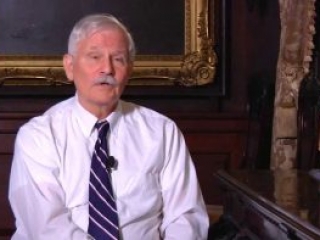
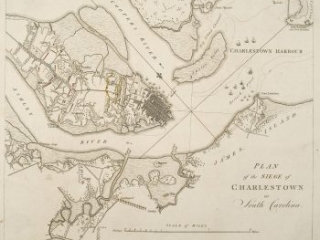
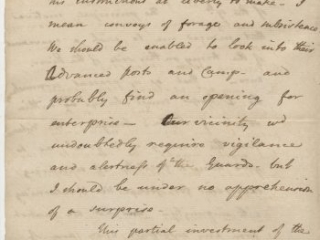
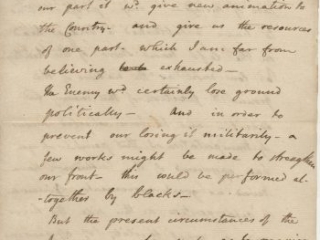
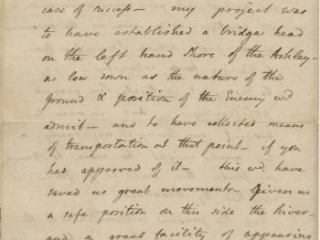
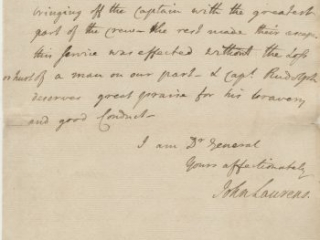
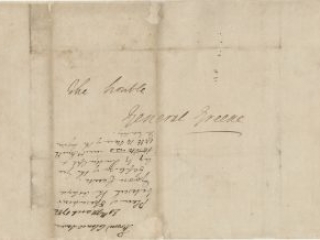
![Click for a larger view. Marie Joseph Paul Yves Roch Gilbert Du Motier, marquis de Lafayette, A.D.S. La Grange [France], November 10, 1825](https://www.americanrevolutioninstitute.org/wp-content/uploads/2019/10/MSS-L2010F168-Lafayette-ADS-La-Grange-November-10-1825-verso-large-350x436-320x240_c.jpg)